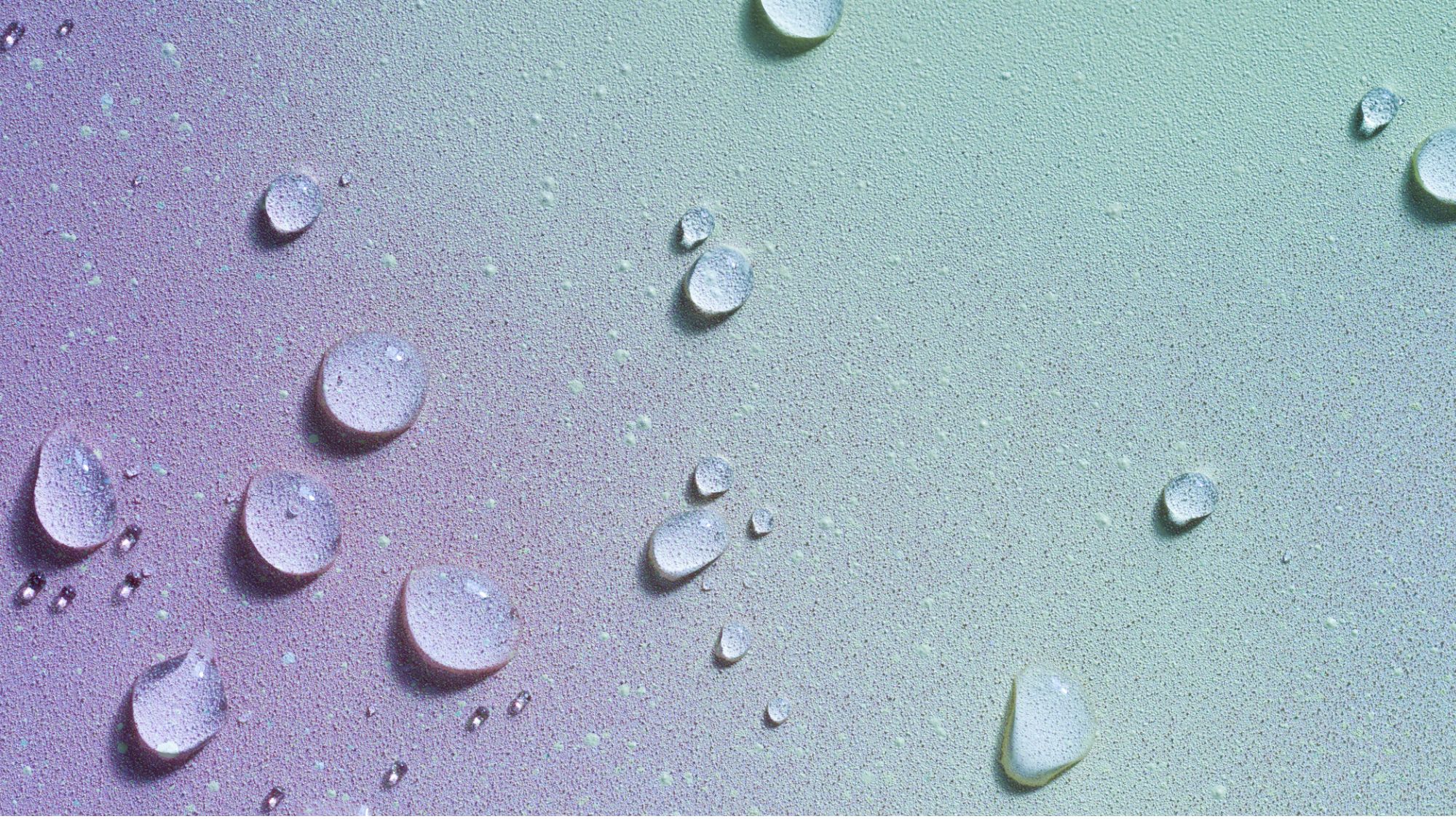"I lived in a mouldy flat for months - and have faced serious health issues ever since."
Do you know if your living conditions are making you sick?

As the weather gets colder, more and more Brits across are finding mould in their homes and experiencing the health issues that can come with it, too.
New statistics from Homebase show that as many as 85% of you have found mould in your house at some point, with the pesky fungi most prevalent between the winter months of October and April. If you've been doing the maths, you'd be correct in thinking that it's currently peak season, meaning it's even more important you read up on the tell-tale signs that you might have it at home.
During the winter months, many houses suffer from damp and mould growth due to increasing levels of condensation. It's simple - you're cold, so you heat your house to keep your house warm. But according to the Centre for Disease Prevention, mould spores can then drop onto surfaces where there is excessive moisture - causing mould growth.
So, what impact does this have on your health and wellbeing? Is it really that bad for you, and what are the main symptoms to watch out for? All good questions, which an expert has answered for you below.
Mould toxicity is on the rise - 5 signs you might have it at home
According to Dr Kerry Aston, functional health doctor, consultant and founder of The Movement Medic, mould toxicity, also known as mycotoxin-related illness, is a health condition that results from exposure to toxic moulds.
"These moulds thrive in warm, damp, and humid environments, and they produce mycotoxins that can disrupt cellular structures and vital processes in the human body, leading to a range of adverse health effects," she explains.
7 signs your flat or house might be mouldy
Know this - identifying mould in your living space is the first step to stopping yourself from getting sick.
Marie Claire Newsletter
Celebrity news, beauty, fashion advice, and fascinating features, delivered straight to your inbox!
Not sure what the main signs look like? The expert explains that the most common signs of mould in your flat include:
- Strange musty odours
- Worsening asthma or allergies while indoors
- Persistent cough, cold, or fatigue
- Recent water or moisture issues
- Dark stains on walls or ceilings
- Peeling wallpaper
- Dark or black grout.
@hopewellfamilycare ♬ f urself in vegas - SHIMA
How can mould impact your health?
Good question - and something everyone wants to know the answer to at current, as mould levels rise in housing across the UK.
Aston explains: "Mould toxicity can have a significant impact on your health. It can affect nearly every system in the body and may lead to various symptoms, especially if you have preexisting respiratory conditions, allergies, or a weakened immune system."
Worried you might already be getting sick? The most common signs of mould toxicity are variable but can include:
- Difficulty concentrating, brain fog, poor memory
- Mood swings, depression, anxiety
- Chronic fatigue
- Sleep disturbances
- Digestive problems
- Migraines and headaches
- Skin issues (eczema, psoriasis, rashes)
- Respiratory symptoms (coughing, wheezing, shortness of breath)
- Runny nose, sinus congestion, watery eyes, sore throat
- Muscle weakness, joint pain
- Food sensitivities.
Similarly, it's worth noting that some of you are at higher risk for of developing mould toxicity issues than others. "Those with a family history of allergies or asthma, preexisting respiratory conditions, workplace exposure, and genetic predisposition to ineffective biotoxin detoxification are at higher risk," explains the doctor.
What to do if you find mould at home
If this is you - there are plenty of simple, actionable steps that you can take to safeguard both your health and also your home.
First and foremost, Dr Aston advises having a deep and thorough inspection of your living space. "Look for visible signs of mould, and address any water leaks or moisture issues," she recommends. This way, you can find the root cause of the issue and make sure you're not spending too much time close to it.
Next up, the Dr recommends consulting a healthcare provider or GP. It's important to discuss your symptoms with a healthcare provider who has experience in mould-related illnesses, however, or they may not be best positioned to advise. If they do, though, "they will be able to give you the correct guidance on treatment and advise on relevant testing," she shares.
Similarly, it's important to consider professional help, if you can afford it. "If you have identified mould in your home, it might be worth seeking professional help to ensure it’s managed correctly and prevent future growth," she continues. Small steps like improving your indoor air quality (think air purifiers with HEPA filters, proper ventilation, and reduced humidity levels) will also help.
Do note, though: mould toxicity can be a complex and challenging condition to diagnose and manage, stresses the expert. "It's often overlooked in conventional medicine, but integrative and functional medical communities recognise its significance," she details.
That said, if you are struggling, do reach out for help. "Early detection and proactive steps are vital to addressing mould toxicity and its potential health impacts," she concludes.
@livingwith.adhd ♬ original sound - Beth | ADHD & arthritis
Bottom line: if you are experiencing any of the above symptoms or are concerned that you may be exposed to mould, do consult a healthcare professional for proper evaluation and diagnosis, advises the expert.
"I lived in a mouldy flat for months - and it's seriously impacted my health."
Karolina Drozdowska is a 36-year-old Media Relations Lead from Poland who's lived in the UK for over fourteen years. She developed asthma as a result of mouldy living conditions.
"Back in 2015, I was living in a block of flats in Leeds City Centre. I'd had no other incidents while living there but woke up one day to what sounded like heavy rain, which I quickly found out was unfortunately a very bad leak coming through my ceiling."
"Because most people were away and celebrating with their families, nobody was available to help me. My estate agent wasn't answering as it was Christmas Day, and I didn't have the landlord's details. Eventually, I had to call the building management who called for help. When they arrived, they couldn't believe what they saw. There was so much water and so much damage that they had to call for extra resources. They had to force open the door in the flat above to stop the leak. (which was caused by a broken boiler)."
"I received no support or help from my landlord or the estate agent. For months I had to sleep in the living room as my bedroom was flooded and damp. That said, the living room was also affected and damaged - it was constantly damp and cold. All my letters emailed to my estate agent were ignored and eventually when answered, not much support or help was offered. I was offered one-month free rent but the stress of living in those conditions was a lot more concerning and most importantly my health was affected."
"I soon developed symptoms as a result. It started with a very bad cough which three lasted weeks - when I went to see my GP, they immediately asked about my living conditions. I explained the situation and was referred for a chest scan and other tests and then I was told I developed asthma. My GP confirmed that the dampness and mould that developed in my flat had caused this."
"He also recommended that I move out of my flat as soon as possible, which for a number of reasons wasn't possible. Today, my asthma is maintained - that said, I've been living with asthma ever since and wish I didn't have to rely on inhalers every day."
"I wish I'd received more support from either my landlord or estate agent to help me and find me a temporary accommodation. Most importantly, I wish I could have avoided developing asthma."
"Unfortunately, there are so many people who, similarly to me, don't receive any help either. It's the landlord's responsibility to take action if you report any dampness or mould, but I can say that it seems today that not many landlords do much about it."

Ally Head is Marie Claire UK's Senior Health and Sustainability Editor, nine-time marathoner, and Boston Qualifying runner. Day-to-day, she heads up all strategy for her pillars, working across commissioning, features, and e-commerce, reporting on the latest health updates, writing the must-read wellness content, and rounding up the genuinely sustainable and squat-proof gym leggings worth *adding to basket*. She also spearheads the brand's annual Women in Sport covers, interviewing and shooting the likes of Mary Earps, Millie Bright, Daryll Neita, and Lavaia Nielsen. She's won a BSME for her sustainability work, regularly hosts panels and presents for events like the Sustainability Awards, and is a stickler for a strong stat, too, seeing over nine million total impressions on the January 2023 Wellness Issue she oversaw. Follow Ally on Instagram for more or get in touch.
-
 This is not a drill: you can now shop Alexa Chung's actual wardrobe on Vinted
This is not a drill: you can now shop Alexa Chung's actual wardrobe on VintedOwn a piece of sartorial history
By Penny Goldstone
-
 New Look’s spring collection has dropped—as a picky fashion editor, I’m seriously impressed
New Look’s spring collection has dropped—as a picky fashion editor, I’m seriously impressedSpring trends at affordable prices
By Jazzria Harris
-
 I'm the founder of an ethical brand marketplace - why, in the wake of tariff-gate, protecting independent businesses is more important than ever
I'm the founder of an ethical brand marketplace - why, in the wake of tariff-gate, protecting independent businesses is more important than everThis Earth Day, the founder of Wolf & Badger shares why protecting sustainable brands is so pivotal.
By Ally Head